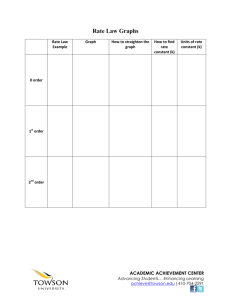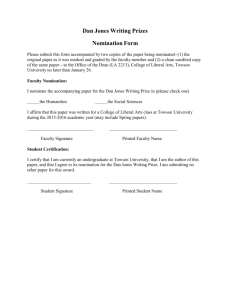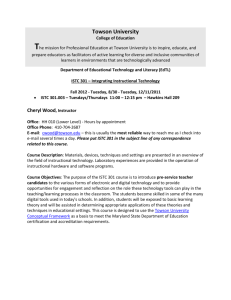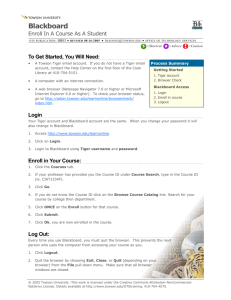Towson University - Learning through Action
advertisement
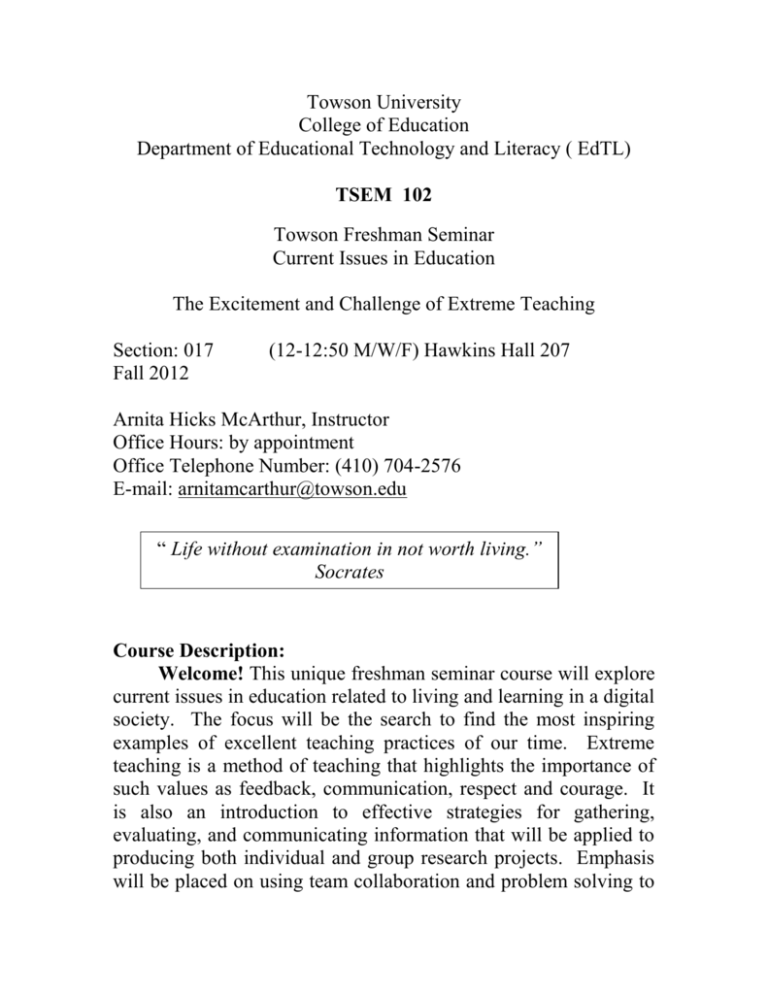
Towson University College of Education Department of Educational Technology and Literacy ( EdTL) TSEM 102 Towson Freshman Seminar Current Issues in Education The Excitement and Challenge of Extreme Teaching Section: 017 Fall 2012 (12-12:50 M/W/F) Hawkins Hall 207 Arnita Hicks McArthur, Instructor Office Hours: by appointment Office Telephone Number: (410) 704-2576 E-mail: arnitamcarthur@towson.edu “ Life without examination in not worth living.” Socrates Course Description: Welcome! This unique freshman seminar course will explore current issues in education related to living and learning in a digital society. The focus will be the search to find the most inspiring examples of excellent teaching practices of our time. Extreme teaching is a method of teaching that highlights the importance of such values as feedback, communication, respect and courage. It is also an introduction to effective strategies for gathering, evaluating, and communicating information that will be applied to producing both individual and group research projects. Emphasis will be placed on using team collaboration and problem solving to examine current issues in education. Topics may include testing, bullying, homelessness and hunger and the impact on the education of children, K-12 online education, nutrition, school violence, English language learners and more. The overall function of the seminar is to bring together small groups for recurring meetings, focusing each time on some particular topic. It is a place for assigned reading to be discussed, questions can be raised and debates conducted. Emphasis will be placed on intense readings and research followed by group discussions in class as well as in the blackboard forum. Goals of the seminar are mastery, method and community. This seminar will be both a reading and research seminar. Students will experience the argumentative/analytical side of every issue researched. Course Goals: The goals in this course are aligned with the Maryland Teacher Technology Standards *and the Essential Dimensions of Technology Standards for Teachers developed by the International Society of Technology Educators (ISTE). The ISTE standards can be located at http://iste.org. In addition, the goals of this course are guided by the 7 Integrated Themes of the Vision of the Towson College of Education Conceptual Framework for Professional Education *The Maryland Teacher Technology Standards will be on a separate handout Students enrolled in TSEM 102- The Excitement and Challenge of Extreme Teaching will master the following goals: Prepare and present a compelling substantive interpretation, argument, and/or analysis of a problem or issues in a research paper Gather and use academic resources effectively and according to the standards and rules of academic integrity Understand and evaluate the nature and possible causes and implications of events, behavior, problems, and issues from an informed and intellectually balanced perspective Connect concepts and empirical evidence in logically coherent, valid, and compelling ways Understand and appreciate social and cultural differences among individuals, groups, and societies and to engage and learn from others with different backgrounds and perspectives Participate responsibly and effectively in group efforts to address and solve problems, where appropriate within the course format Students will examine current educational issues and trends using a variety of information resources and technologies. Some of the course activity will take place online within the Blackboard environment (http://bbweb.towson.edu) Course Objectives: Maryland Teacher Technology Standards of individual objectives are in parentheses. Students will display competency in essential skills required of a college graduate by: Writing clearly and persuasively for a variety of purposes and for the different audiences, revising and improving such texts (MTTS ll) Individual research paper Making articulate, persuasive, and influential presentations (MTTS II) Group presentation Reading, interpreting, analyzing and evaluating written discourse (MTTS I) Bibliography gathered must include at least five journal articles, three webpages, one newspaper article and one reference book Integrating ideas and concepts in order to make judgments based on evidence Research paper will take a strong stance and be supported with scholarly evidence from research Research a topic, develop an argument and organize supporting details (MTTS I) Groups will investigate a topic with attention to extreme challenges in the teaching profession with emphasis on innovative solutions Using software as appropriate for writing, for spreadsheets, for statistical analysis, for calculations, or for presentations (MTTS II) Emerging teaching tools will be used in class such as interactive whiteboards and student response clickers. Students will use Boolean logic to search library databases. Students will organize their files on the university server. Blackboard will be used for quizzes, blogs and wikis. Word processing and presentation software will be used throughout the course. Required Resources: Text: No textbook is required; however, you will be expected to read from print and online resources. Flash drive Folder or section in a notebook to keep handouts College-level dictionary and thesaurus Grammar reference Saving Data and Documents: Safely storing and accessing your data from this course is of the utmost importance. It is recommended that you do not save data to the classroom computers. Therefore, you need to be prepared each session with a method for saving your work. You are required to bring your flash drive to every class. Please be sure to back up your work! Virus alert! The computers in the class are equipped with virus protection programs. Important Class Requirements: All students are required to have an active TU e-mail account for the duration of this class. All e-mail from your instructor will be sent to your Tiger account. It is the student’s responsibility to check Tiger account e-mail on a regular basis. Enter only your section number (017), first initial and last name in the subject line of all e-mails. A key tool and component for your success in this course will be your use of the online course supplement supported by Towson University, Blackboard. Simply go to http://bbweb.towson.edu and log in using your Towson username and the password you set for your e-mail. Technology Skills: Assignments and activities for this course will require the student to develop and or refine a variety of technology skills. Students are encouraged to use the resources of the Student Computing Skills Center (SCSC) for training and answers to specific questions regarding technology on the Towson campus. Listed below are the required skills for TSEM 102. These skills are aligned with the Maryland Teacher Technology Standards. Formatting documents Creating folders for organized file storage Copying and pasting text from one document to another Saving files in various formats Attaching documents to e-mail messages Saving images from the Internet to use in PowerPoint and Web applications Posting messages to the Blackboard discussion board and submitting replies Using a scanner to scan documents and images to save as computer files Using a digital camera to capture images Simple photo editing of digital pictures Class Attendance: Regular and timely class attendance and participation in online assignments are important elements that contribute to the final course grade. There will be a sign-in book at the front of the classroom. It is your responsibility to sign in as soon as you enter the classroom. If you do not, you will be counted absent, even if you are in class. Tardiness and early departure from class are unacceptable. University policy on class attendance and absences is outlined on page 22 of the 2008-2009 Towson University Undergraduate Catalog. Class Discussion and Participation: A major portion of this class is based on weekly readings of relevant articles and viewing of pertinent video clips that feature important educational issues. You are expected to carefully read the assignments and view any video material for each week and be prepared to participate in classroom discussions and activities. Your participation in this course is vital. In addition, I encourage you to share items that you think might add to and improve the quality of the class. This includes bringing in or uploading relevant articles and web sites to Blackboard. You will be expected to make up any work you missed due to absence. Classroom Policies: Students are expected to adhere to the Towson University policies for responsible computing which can be found online at the following locations: TU undergraduate catalog: http://www.collegesource.org/displayinfo/catalink.asp and OTS University Guidelines for Responsible Computing: http://wwwnew.towson.edu/adminfinance/ots/res.comp.policy.asp Set the ringer of your cell phone to silent or vibrate Use the classroom computers for academic use Use the proper logon and password to start your computer Close all applications before you leave Be sure to logout of Blackboard at the end of class Save all work on your personal flash drive Assignments: All assignments must be complete before class. Late assignments and hand-written assignments will not be accepted. This means, if any assigned work is to be computer generated to be handed in, it must be ready to hand in before class begins. No one may make copies in the classroom unless permission is given. Course Scoring: Grades for this course will be determined from two areas— personal assignments and cooperative (paired or group) assignments. To achieve the maximum number of points for the course, students must demonstrate quality work on their own as well as active participation in two group projects. Personal Assignments Class Participation and attendance 20 points Issues in Education Response Sheets 60 points PowerPoint Collaboration 20 points Creative Project 10 points Research paper-rough draft 40 points Research paper-final product 100 points 250 points Group Participation Personal grades will be awarded according to each student’s contribution to the group assignments and by evaluations from fellow group members. Participation in group research and presentation points 50 Grading Distribution: The class grading policy is consistent with the University regulations, which are found on page 23 in the 2008-2009 Towson University Undergraduate Catalog. Grading distribution for this course is as follows: A AB+ 285-300 270-284 261-269 B BC+ C D F 252-260 240-251 234-239 210-233 189-209 188 and below Academic Dishonesty and Plagiarism: Towson University’s policy on academic dishonesty can be found in the most recent Towson University Undergraduate Catalog. Cases of cheating or plagiarism on assignments or examinations will result in a score of zero for the particular work, +++the possibility of failure for the course or dismissal from the university. Disability Support: Students in need of assistance with physical or learning disabilities may contact the Office of Disability Support Services (DDS) at 410-704-2638. Upon proper documentation of need for accommodations, the instructor will work with the student to make reasonable accommodations for individual needs. Ethics and Conduct: Disruptive behavior, as defined by the instructor, is not acceptable under any circumstances. Any student who is disruptive will be dismissed from the course.
